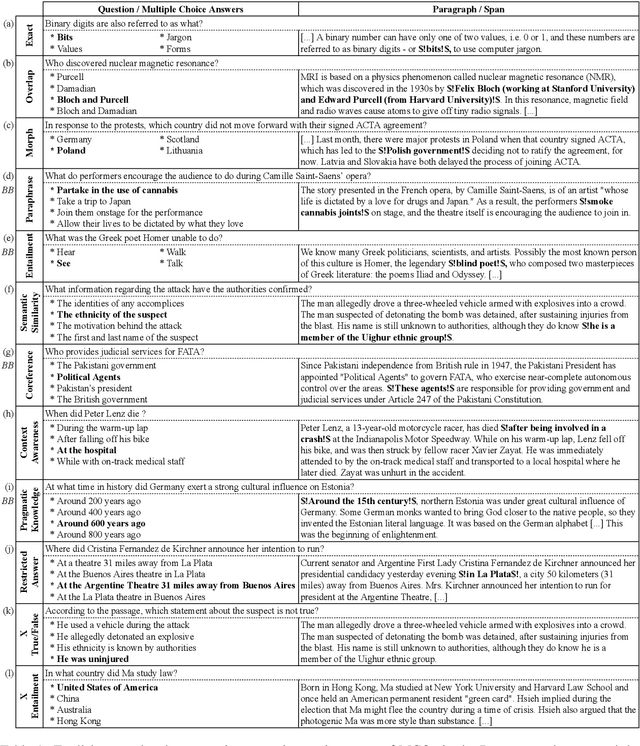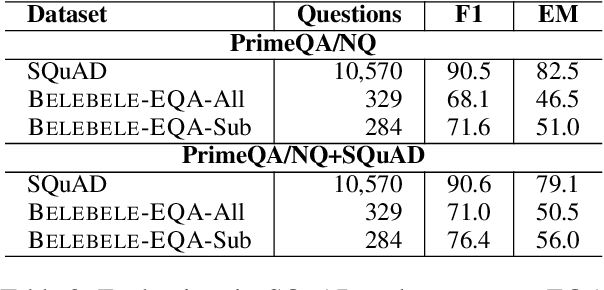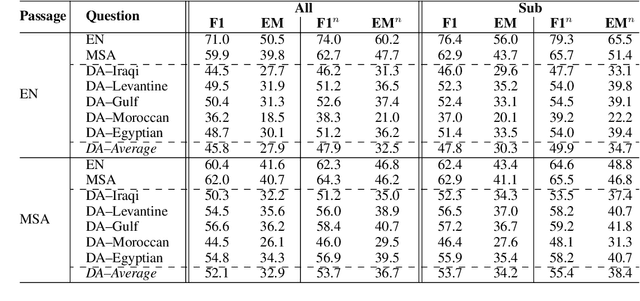Samar Mohamed Magdy
Pearl: A Multimodal Culturally-Aware Arabic Instruction Dataset
May 28, 2025Abstract:Mainstream large vision-language models (LVLMs) inherently encode cultural biases, highlighting the need for diverse multimodal datasets. To address this gap, we introduce Pearl, a large-scale Arabic multimodal dataset and benchmark explicitly designed for cultural understanding. Constructed through advanced agentic workflows and extensive human-in-the-loop annotations by 45 annotators from across the Arab world, Pearl comprises over K multimodal examples spanning ten culturally significant domains covering all Arab countries. We further provide two robust evaluation benchmarks Pearl and Pearl-Lite along with a specialized subset Pearl-X explicitly developed to assess nuanced cultural variations. Comprehensive evaluations on state-of-the-art open and proprietary LVLMs demonstrate that reasoning-centric instruction alignment substantially improves models' cultural grounding compared to conventional scaling methods. Pearl establishes a foundational resource for advancing culturally-informed multimodal modeling research. All datasets and benchmarks are publicly available.
Casablanca: Data and Models for Multidialectal Arabic Speech Recognition
Oct 06, 2024



Abstract:In spite of the recent progress in speech processing, the majority of world languages and dialects remain uncovered. This situation only furthers an already wide technological divide, thereby hindering technological and socioeconomic inclusion. This challenge is largely due to the absence of datasets that can empower diverse speech systems. In this paper, we seek to mitigate this obstacle for a number of Arabic dialects by presenting Casablanca, a large-scale community-driven effort to collect and transcribe a multi-dialectal Arabic dataset. The dataset covers eight dialects: Algerian, Egyptian, Emirati, Jordanian, Mauritanian, Moroccan, Palestinian, and Yemeni, and includes annotations for transcription, gender, dialect, and code-switching. We also develop a number of strong baselines exploiting Casablanca. The project page for Casablanca is accessible at: www.dlnlp.ai/speech/casablanca.
Can a Multichoice Dataset be Repurposed for Extractive Question Answering?
Apr 26, 2024



Abstract:The rapid evolution of Natural Language Processing (NLP) has favored major languages such as English, leaving a significant gap for many others due to limited resources. This is especially evident in the context of data annotation, a task whose importance cannot be underestimated, but which is time-consuming and costly. Thus, any dataset for resource-poor languages is precious, in particular when it is task-specific. Here, we explore the feasibility of repurposing existing datasets for a new NLP task: we repurposed the Belebele dataset (Bandarkar et al., 2023), which was designed for multiple-choice question answering (MCQA), to enable extractive QA (EQA) in the style of machine reading comprehension. We present annotation guidelines and a parallel EQA dataset for English and Modern Standard Arabic (MSA). We also present QA evaluation results for several monolingual and cross-lingual QA pairs including English, MSA, and five Arabic dialects. Our aim is to enable others to adapt our approach for the 120+ other language variants in Belebele, many of which are deemed under-resourced. We also conduct a thorough analysis and share our insights from the process, which we hope will contribute to a deeper understanding of the challenges and the opportunities associated with task reformulation in NLP research.
 Add to Chrome
Add to Chrome Add to Firefox
Add to Firefox Add to Edge
Add to Edge